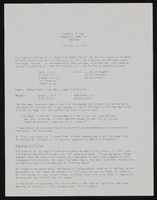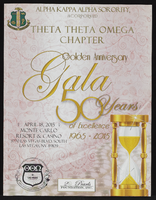Search the Special Collections and Archives Portal
Search Results

Maria Moore interview, August 2, 2019: transcript
Date
Archival Collection
Description
Interviewed by Elsa Lopez. Born in Belize, Director of AARP, speaks English, Spanish and Creole. Specialist in senior affairs.
Text

Transcript of interview with Jay Poster by Barbara Tabach, August 26, 2016
Date
Archival Collection
Description
Music brought Jay Poster to Las Vegas for a brief time in 1974. Jay wanted to pursue a musical career and his cousin was a professional musician with the Nat Brandwynne Orchestra at Caesars Palace. To Jay?s disappointment, within a few months his cousin Jack Poster left Las Vegas for a road tour. So Jay decided his best strategy was to return home to San Diego and his studies at San Diego State University. It would be over a decade later before Jay returned to Las Vegas to live and this time it became permanent. This time it was not for music. For beyond his musical talent, Jay had a gift for connecting with people of all of ages and walks of life. He was good at sales and his day job selling office furniture offered him the opportunity to transfer to Las Vegas in 1986. Within a few years, however, it was a recruiter for Palm Mortuaries who introduced Jay to his defining career moment and to Allen Brewster, a prominent Jewish leader and founder of King David Cemetery and Mortuary. It was 2001. Jay has been King David?s ever since and is the General Manager. In this interview, Jay describes his personal and spiritual growth through his career in funeral services and his respect for the Jewish traditions of burial and grieving. In addition, his passion for music has also soared and he talks about his participation in the Shabbatones at Congregation Ner Tamid and Desert Winds, a community based performance organization. He shares his love of traditional Jewish klezmer music and the Meshugginah Klezmorim.
Text

Transcript of interview with Michael Saltman by Barbara Tabach, December 16, 2014
Date
Archival Collection
Description
In this interview, Michael Saltman recounts his family background, his schooling in Michigan, and living abroad in London and Munich. His travels to Israel in 1968 reinforced his connection to Judaism. Saltman and his wife, Sonja, moved to Las Vegas in 1975 and he began working with Larry Larkin, who eventually became his partner. He discusses several projects he completed with Larkin, including shopping centers and apartment complexes. He talks about the changes in Las Vegas that came about from the availability of financing from legitimate sources, and the population growth of the area. He then talks about his involvement in the local Jewish community with the Jewish Federation, Anti-Defamation League and Congregation Ner Tamid.
In 1942, Michael Saltman, the son of a rugged Canadian entrepreneur and of an educator, was born in Flint, Michigan. Michael spent a fulfilling childhood in Flint, where his family was involved in the Jewish community, even helping start a new temple. However, his life changed dramatically when his father passed away during his teenage years. At his mother's insistence, Michael went to law school after graduating from Michigan State University, and received his Juris doctor from Wayne State University. From Detroit, Michael headed to London to participate in an LL.M. program, though he quickly withdrew and landed a position with a life insurance and investment company in London. Michael soon relocated to the company's Geneva office, where his job included establishing operations in Israel. It was during these trips that he more intensely connected with Judaism and his Jewish identity. Michael left the company to join a former colleague at Shareholders Capital Corporation, where he met his wife Sonja. The couple moved to Munich, where they lived until 1975, until moving to Las Vegas. In Las Vegas, Michael became a successful real estate developer. His projects include apartments, shopping centers and office parks, like Village Apartments, Campus Village Shopping Center and Renaissance Center. He later opened Food 4 Less grocery stores in Nevada, Utah and California, eventually buying the Kansas-based company from Lou Falley. He and his partner later sold the company to Kroger. Michael served on the local Jewish Federation's board of directors, and Sonja is a longtime board member for the Anti-Defamation League's regional office in Las Vegas. In 2003, Michael and Sonja co-founded the Saltman Center for Conflict Resolution within William S. Boyd School of Law. Michael's other efforts to promote peaceful conflict resolution include the production of Streetball Hafla, a movie shot in Israel about Jewish and Palestinian teenagers interacting in basketball camp.
Text

Transcript of interview with Gil Cohen by Claytee White, August 5, 2014
Date
Archival Collection
Description
Interview with Gil Cohen by Claytee White on August 5, 2015. In this interview, Cohen discusses growing up in Las Vegas and attending University of Nevada at Reno. He returned to Las Vegas to join the management training program at the Stardust. He talks about his friendships with Moe Dalitz and Carl Cohen, and his interest in golfing. He also discusses corporate ownership of casinos, unions, and his experiences working at different Strip hotels.
Gil Cohen came to Las Vegas in 1957, when was ten years old, when his father, Yale Cohen, was recruited by Moe Dalitz to work at the Stardust Hotel and Casino. Cohen graduated from University of Nevada Reno, and started working at the Stardust through the management-training program. In 1975, he was made hotel manager, his first of many leadership positions in Strip properties, which have included the Dunes, Aladdin, Hacienda and Monte Carlo, where he currently works as a casino host.
Text

Economic Opportunity Board of Clark County (Nev.): memos, agendas, and meeting minutes
Date
Archival Collection
Description
From the Clark County Economic Opportunity Board Records -- Series I. Administrative. This folder contains memos, agendas, and minutes from meetings of the Clark County Economic Opportunity Board from February 1971 through January 1973.
Text

Theta Theta Omega, 50th Golden Anniversary Gala (Monte Carlo Hotel)
Date
Archival Collection
Description
From the Alpha Kappa Alpha Sorority, Incorporated, Theta Theta Omega Chapter Records (MS-01014) -- Ivy Leaf magazines and event souvenir programs file.
Text
Nevada Test Site Oral History Project Records
Identifier
Abstract
The Nevada Test Site Oral History Project Records (approximately 1950-2008) consist of oral histories collected by University of Nevada, Las Vegas Department of History for the Nevada Test Site Oral History Project. The collection includes digital audio recordings of interviews, print and digital transcripts, and a small selection of digital video recordings. Some interviews have also been supplemented with photographs, letters, scientific articles, brochures, news clippings and ephemera about the Nevada Test Site.
Archival Collection
K. O. Knudson Photograph Collection
Identifier
Abstract
The K. O. Knudson Photographs (approximately 1920-1969) depict the Las Vegas Grammar School and service, fraternal, and veterans organizations gathered by retired Las Vegas, Nevada school administrator and World War I veteran K. O. Knudson (also known as K. Oscar Knudson). The collection includes images of Knudson, Las Vegas Masonic Lodge members, American Legion members, and school dances. The photographs primarily feature Las Vegas, Nevada.
Archival Collection
Babe Pier Papers
Identifier
Abstract
The Babe Pier Papers (approximately 1962-2012) include promotional materials, photographs, and audiovisual materials documenting the career of Las Vegas, Nevada-based comedian and impressionist, Babe Pier. Materials include Pier's show reels, fliers, posters, and photographs of Pier as a solo entertainer and as part of comedy groups such as the Vagabonds and the Happy Jesters. The collection includes recordings of Pier's appearances on television shows like the Mike Douglas Show and Milton Berle's comedy special as well as his comedic boxing charity fights. Materials also contain personal photographs of Pier and his family, including his wife, Cindy Raft, who managed an entertainment agency and was also an entertainer in Las Vegas.
Archival Collection
Nevada Consolidated Copper Company Records
Identifier
Abstract
The Nevada Consolidated Copper Company Records (approximately 1907-1978) contain the business records of the company, including correspondence, freight bills, ledgers, maps, leaching data, and books relating to mining. The majority of the records post-date the company's name change to Kennecott Mining Company.
Archival Collection
